Is "FinanceGPT" the Next Big Thing?
Written byMelissa Bell

A panel discussion between B2B C-Suite executives leveraging artificial intelligence tools for finance and accounting use cases. Watch the full webinar on demand now.
In a recent webinar, industry experts explored how artificial intelligence (AI) will impact the role of finance and accounting professionals–including the biggest threats and opportunities as well as common use cases. Throughout the discussion, panelists shared their experiences and highlighted the creative ways AI is already being implemented in their field.
In this blog, we'll summarize the key points from the discussion and explore the exciting possibilities AI presents to finance and accounting professionals now and in the future.
Current State & Trends
Threats & Opportunities
Use Cases
Recommendations
Additional resources
Current State & Trends
The webinar began by polling the audience to gauge how attendees are currently using AI, if at all. The results revealed, unsurprisingly, most people were not currently using AI in a professional capacity today.
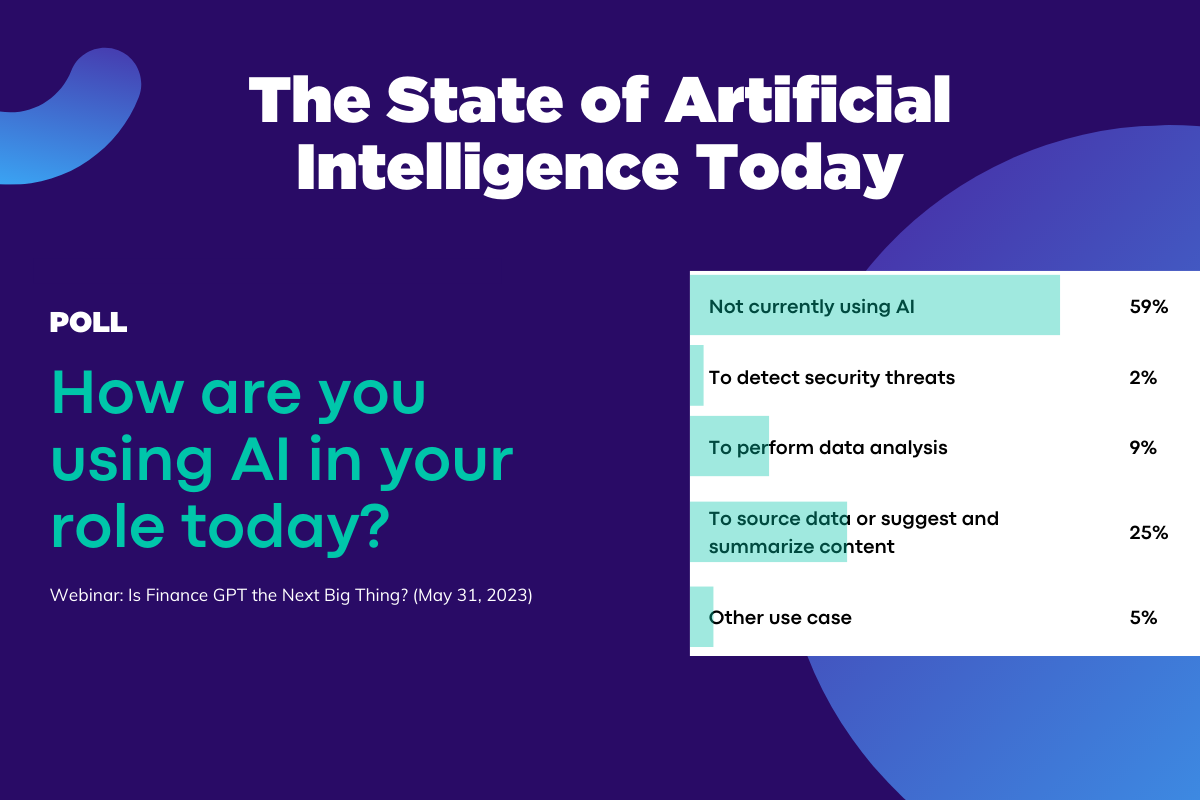
More than half of attendees indicated they are not using AI in their role today.
One of the objectives of the webinar was to provide some ideas for implementing AI in various areas. But first, presenter Tyson Hollas, Decision Scientist, Archaea Energy, provided an overview of five key trends we’re seeing as it relates to AI today.
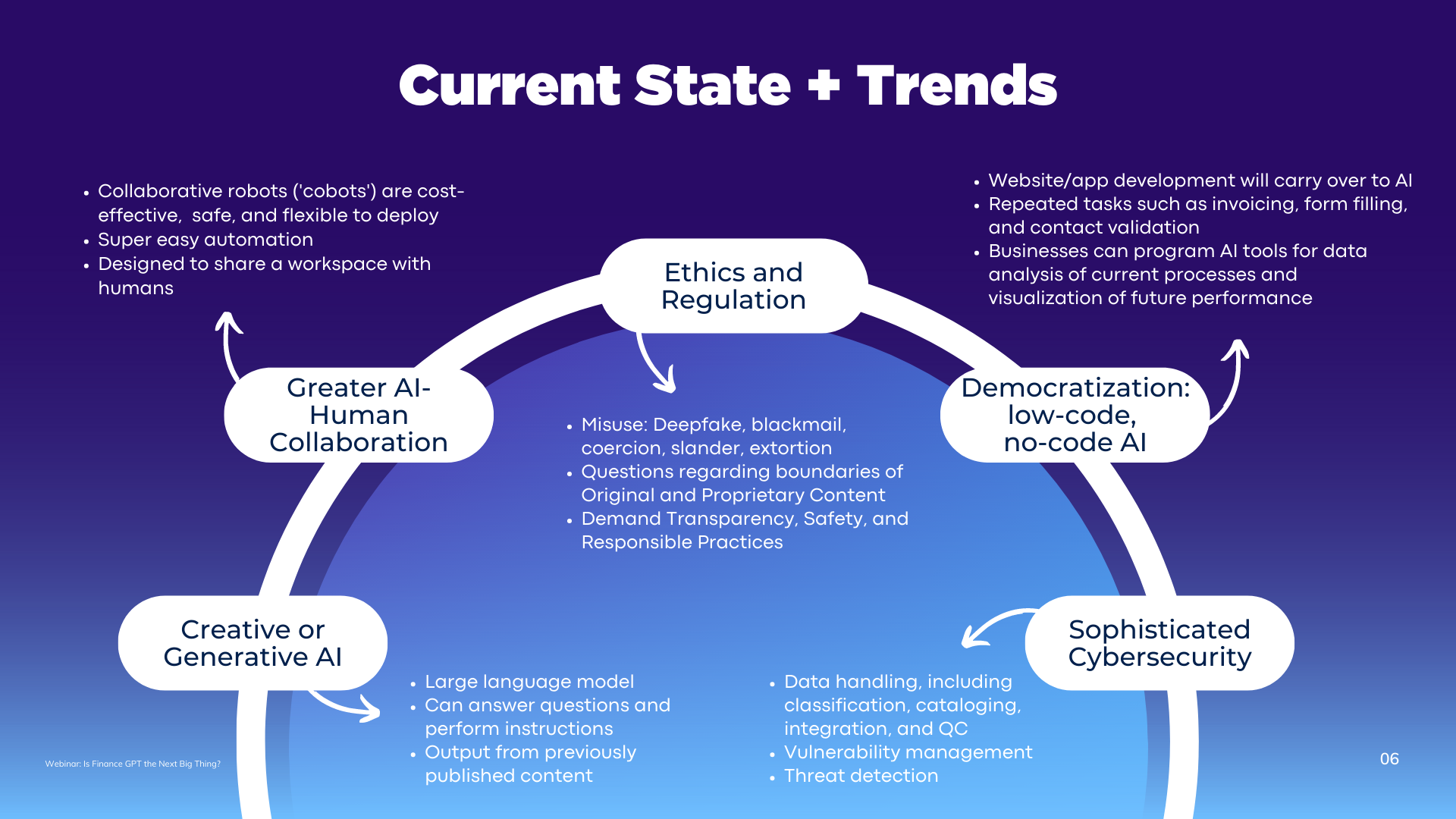
- Creative or Regenerative AI: This refers to large language models like ChatGPT, which can answer questions and perform instructions. Hollas shared that while he personally uses it for research, coding, and analyzing emails, these models have limitations and can sometimes produce inaccurate or biased results due to their reliance on previously published content.
- Greater AI-Human Collaboration: This model describes collaborative robots or cobots, where humans and robots work together. These robots are cost-effective and safe, and advancements in language models contribute to their increased efficiency. Cobots can handle tasks like dispensing, machine tending, and material handling.
- Ethics and Regulation: This area focuses on the ethical considerations and regulations surrounding AI. There are growing concerns around the use of AI to facilitate deep fakes, blackmail, slander, and extortion. Also highlighted was the importance of transparency, safety, and responsible practices in using AI.
- Democracy of Low Code/No Code AI: These tools allow individuals to build applications using configurators, wizards, and drag-and-drop capabilities. This approach will extend beyond websites to various business activities, such as automating repetitive tasks like invoicing and contact validation.
- Sophisticated Cybersecurity: Deploying AI can help detect threats, understand and catalog them, and improve vulnerability management and quality control. There is an opportunity here for AI to play a crucial role in integrating security measures into various systems.

Threats & Opportunities
The panel discussion began with another poll to gauge the audience's perception of both threats and opportunities of AI as it relates to finance professionals. From the threat standpoint, data privacy emerged as the primary concern, closely followed by cybersecurity, embedded bias, and job displacement.
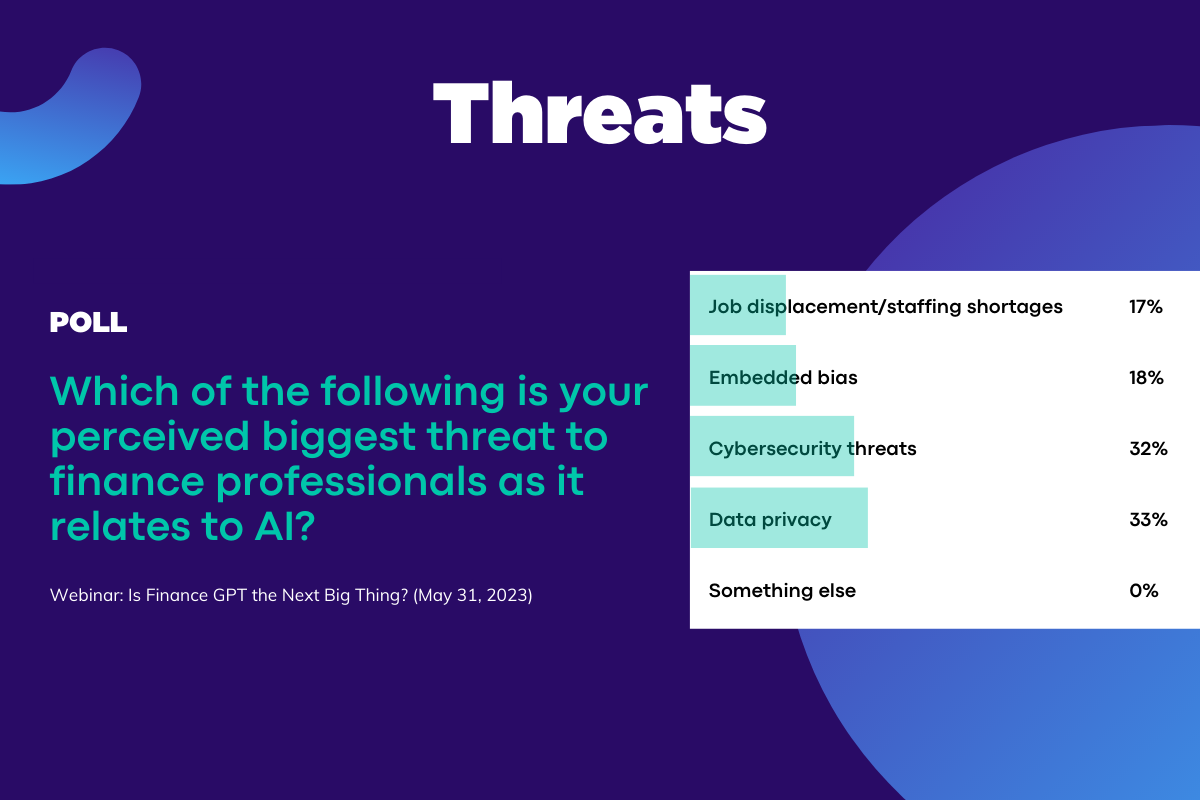
Webinar attendees voted data privacy and cybersecurity as the leading threats of AI.
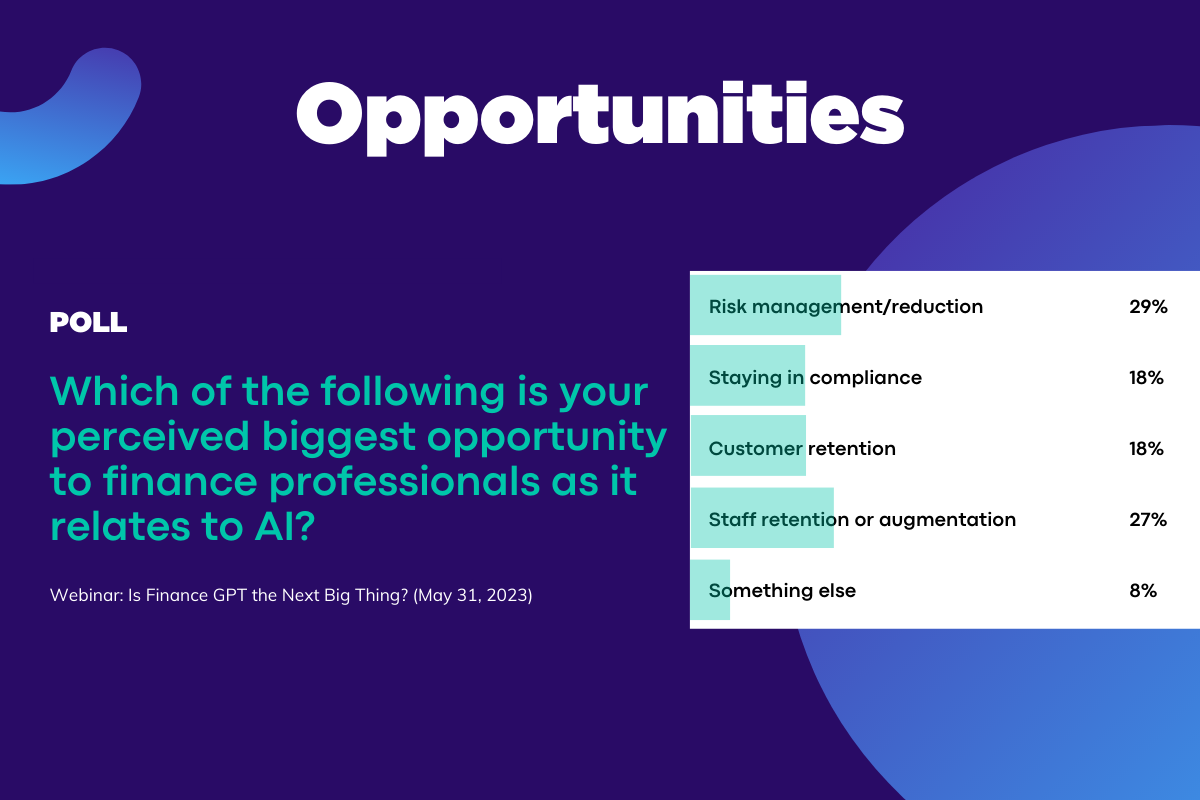
Webinar attendees voted risk management/reduction as the biggest opportunity of AI.
On the other hand, the opportunities presented by AI were found to be split between risk management and staff retention or augmentation. This is likely due to AI’s ability to automate tasks and analyze data at a faster pace, a value add to almost any organization. For instance, AI-powered tools could assist in generating board slides by extracting and analyzing financial information while maintaining data privacy. This would save time and streamline the process, allowing professionals to focus on higher-value tasks.
The panel also recognized the potential of AI in fraud prevention and cybersecurity. AI algorithms can swiftly detect anomalies and unusual activities, helping to mitigate risks associated with fraud and enhancing overall security measures.
Kenny Mullican, chief information officer, Paragon Films, Inc., and Acceleration Economy Practitioner Analyst, expressed his optimism about AI's ability to empower individuals and improve productivity. He emphasized the advantages of leveraging AI tools to accomplish tasks more efficiently, particularly in areas with high demand for specialized professionals like finance and accounting.
Mullican shared, “One of the things that we've found more recently is that it's been difficult to fill all of our accounting and finance staff positions. There's a lot of competition out there, and there is a high demand for finance professionals.”
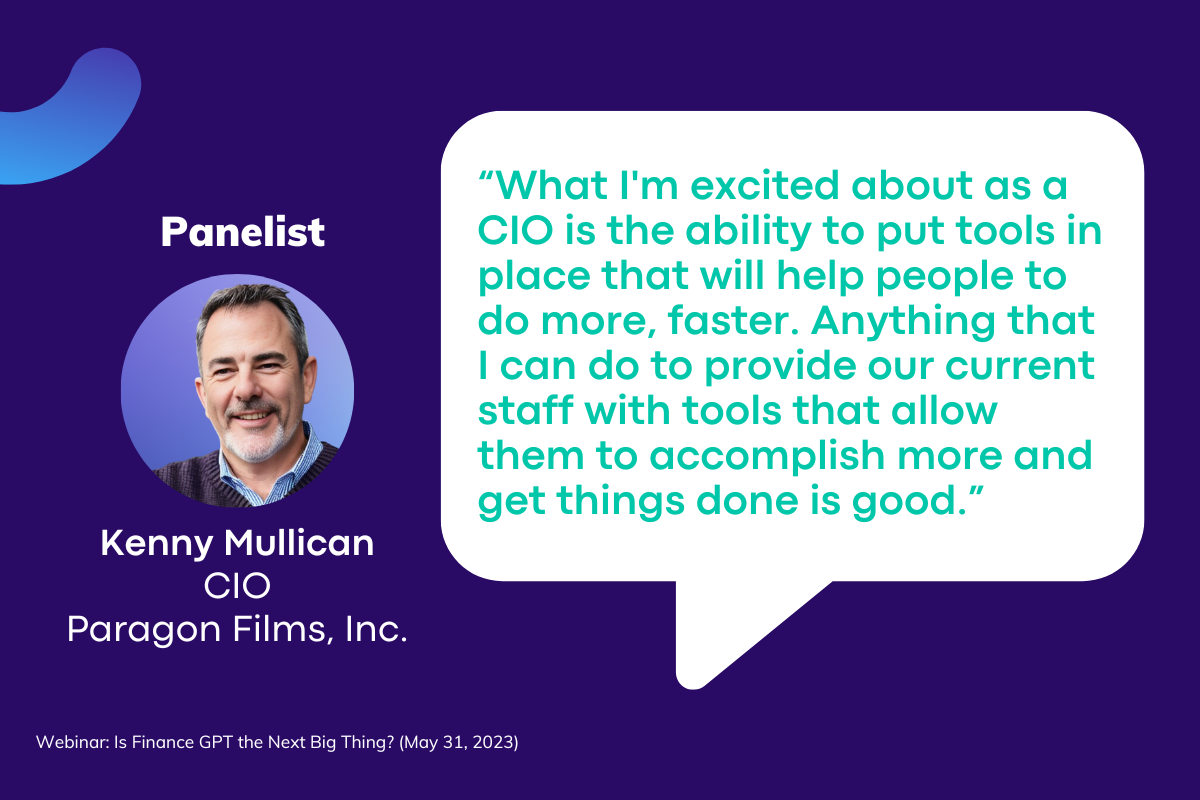
Mullican also acknowledged the potential threats associated with AI, saying pointedly, “We really have to know that if we can use it for good, somebody is also going to use it for evil.” Areas for particular concern include AI’s ability to generate realistic content to commit fraud and phishing attempts. There was unanimous support from the panel about the importance of remaining vigilant and developing strategies to identify and counter malicious activities like this.
Kote Lomidze, chief financial officer, World Learning, highlighted the importance of incorporating machine learning algorithms into finance operations.
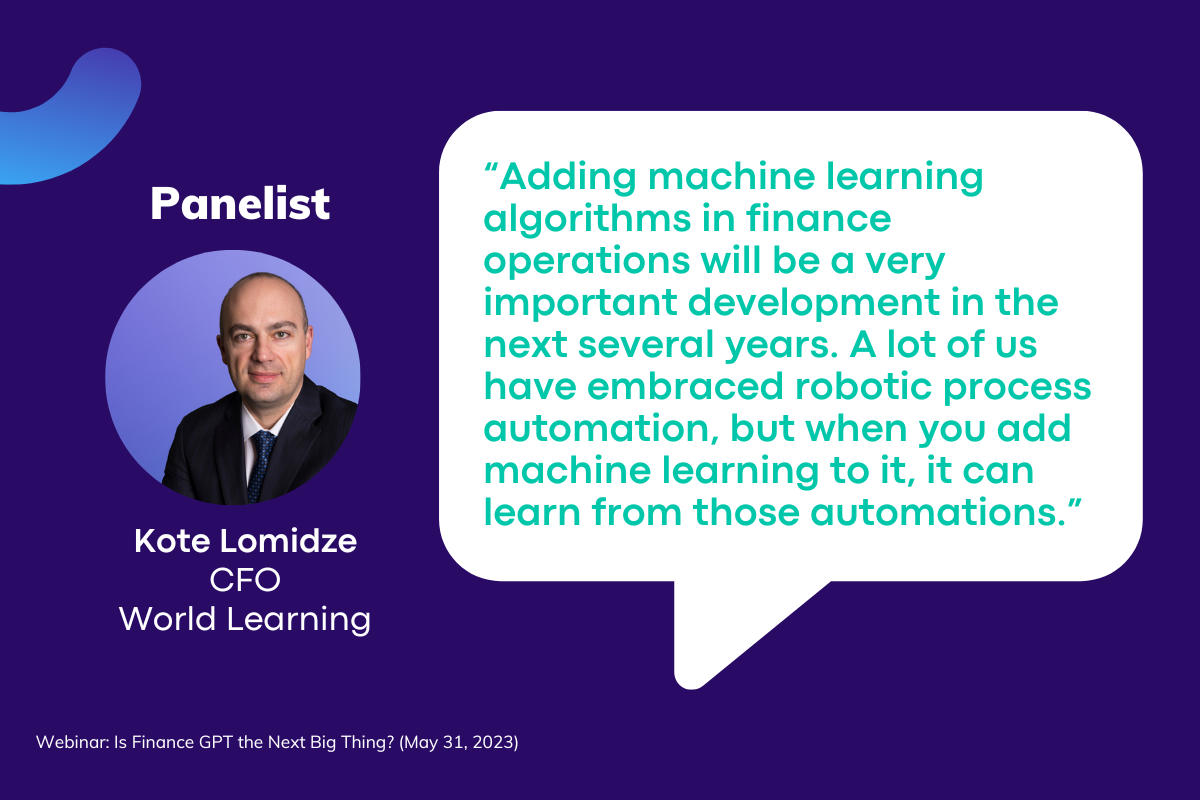
By combining robotic process automation and machine learning, organizations can improve decision-making and enhance efficiency. The ability of AI to learn from human behavior and provide better suggestions was emphasized as a valuable opportunity for organizations.
Nikolos Oakley, chief financial and administrative officer, IntraHealth International, honed in on the significance of AI in fraud management and risk reduction.
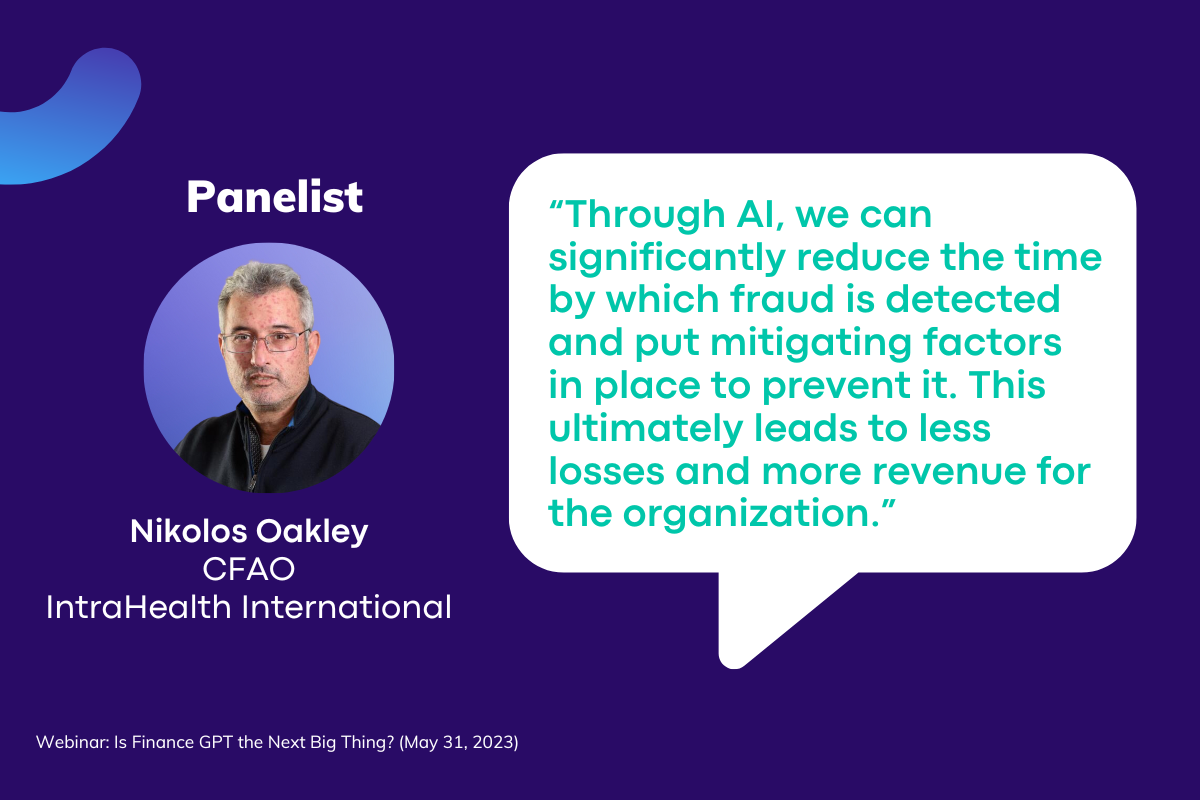
Oakley also emphasized the need for accountability and transparency in AI systems, especially when errors occur. Organizations should be prepared to explain and justify decisions made by AI to auditors and stakeholders.
Use Cases
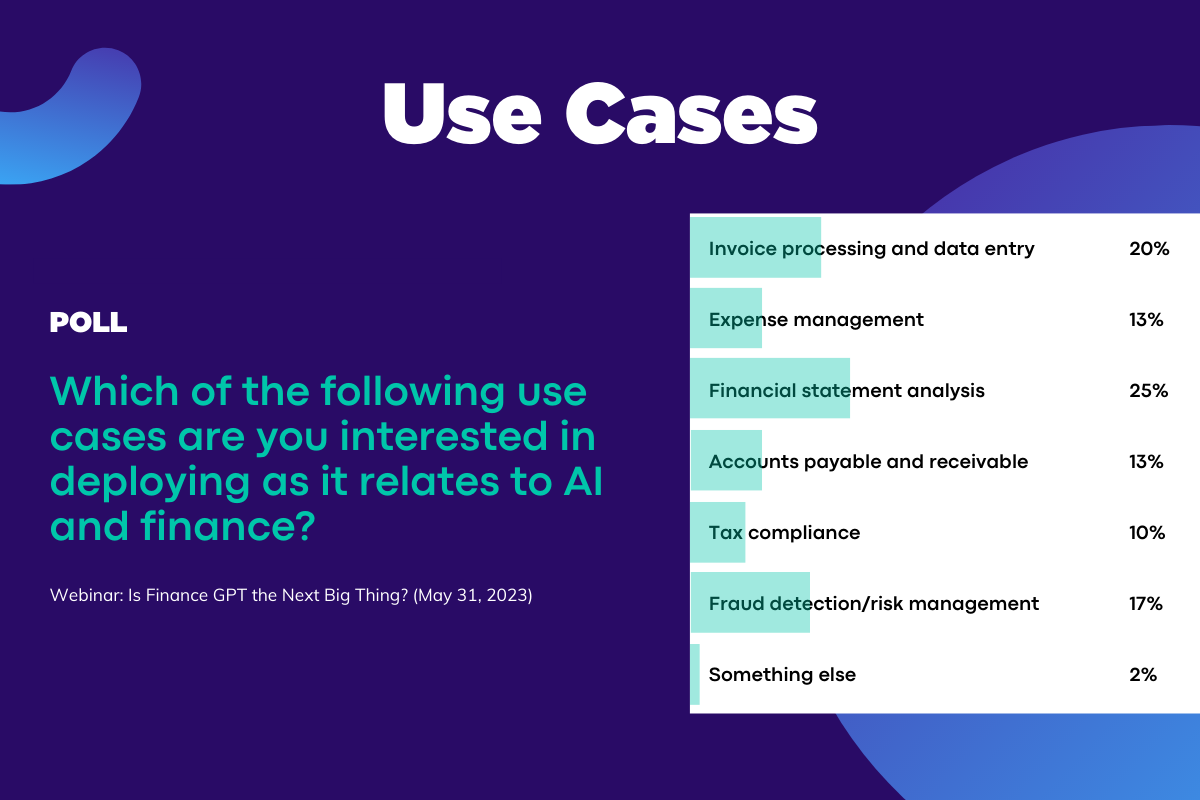
Webinar attendees indicated financial statement analysis as the most interesting use case for AI as it relates to finance.
Harnessing AI for Efficiency and Knowledge
Lomidze shared that his organization uses both in-house developed machine learning algorithms and externally available public AI. They leverage AI for educational purposes, such as learning new GAAP rules or understanding text structures in different countries. These tools provide detailed responses and cited sources, making it easier to navigate complex topics like payroll management. Additionally, they’ve deployed AI for day-to-day tasks, from optimizing travel policies to assisting with expense coding.
“I think down the road we will be looking at how we can use AI and machine learning to help in developing proposals and budgets the proposals and budgets get developed.” - Kote Lomidze, CFO, World Learning
He also proposed organizational-wide Q&A systems to reduce the time spent by finance professionals on repetitive queries.
Transforming Lease Accounting for Nonprofit Organizations
Another area where AI shows promise is in lease accounting, particularly for nonprofit organizations. Compliance with the new lease accounting standard (C. 842) requires a meticulous analysis of leases across multiple countries. As Oakley pointed out, this process is often time-consuming and manual. However, the application of AI can significantly enhance efficiency by automating the identification of accounting entries and streamlining the entire process.
Streamlining Expense Reports and Invoice Processing
Mullican led with describing how AI is already embedded in many existing products and software used in finance and accounting. For instance, expense reporting software utilizes AI to extract information from receipts, automatically identifying details like the vendor, expense category, total amount, and even taxes. Similarly, AI-driven invoice processing systems can quickly extract essential details from invoices, eliminating the need for manual data entry. These advancements save valuable time and reduce the potential for errors.
AI's Role in Manufacturing and Quality Control
While the focus of AI in finance and accounting is evident, Mullican said he’s excited about its application in areas such as manufacturing.
“Manufacturing companies have finance organizations, and in our finance organization even some of the interest goes into costing. Being able to use AI to give more accurate information about what raw materials are being used allows you to get more accurate costs, which then you have more accurate you know, margin calculations, or or anything else that you're that you're doing.” - Kenny Mullican, CIO, Paragon Films, Inc.
Integrating AI into manufacturing processes can also enable faster identification of quality control issues and facilitate proactive measures to maintain efficiency.
Recommendations
Overall, the panel expressed excitement about the future possibilities of AI in their respective fields. That said, the technology is advancing at an unprecedented rate. In fact, it was even cited that the capability of AI large language models doubles every three months, indicating the rapid pace of progress. This revelation underscores the need for individuals and businesses to stay up to date with AI advancements and explore ways to harness its power.
In closing, Mullican stressed the importance of continuous learning and understanding AI capabilities and limitations. Hollas also reiterated the need to be cautious when relying on AI-generated content, as it may contain fictional or inaccurate information.
Bottom line: Being aware of the limitations and risks of AI will help individuals and businesses to more effectively leverage AI tools for meaningful results.
Additional Resources
Below are additional resources about AI provided by our panel:
- Acceleration Economy’s Generative AI Digital Summit On Demand
- Acceleration Economy’s articles and video content about AI
- Kenny Mullican’s most recent article on Generative AI: How Generative AI Transforms Core Processes — and Changes the CIO's Role (accelerationeconomy.com)
- All of Kenny Mullican’s content on Acceleration Economy: Kenny Mullican, Author at Acceleration Economy
- Top 10 Principles for Ethical Artificial Intelligence
- Machine Learning Cornell Certificate Program

About the Author
Melissa Bell
Director of Sales & Marketing
